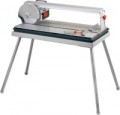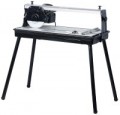Rotation speed
The maximum disc rotation speed provided by the motor of the electric tile cutter. Higher speeds are good for productivity, clean cuts and the ability to handle difficult materials, but they also require the right amount of power.
In general, if a tile cutter is bought for simple work with ordinary facing tiles (for example, repairs in an apartment), you can not pay much attention to this indicator: even the “slowest” models provide enough speed to cope with such tasks. But for cutting specific materials (for example, some types of stone), higher speeds may be required; detailed recommendations on this issue can be found in special sources.
Cutting length
The longest cut that can be made with a tile cutter.
This parameter is relevant primarily for manual tile cutters, as well as for electric stationary units with a top disc feed. In such tools, the cutting element moves along the guide rail and has limited space for movement, and the length of the cut is, in fact, the length of the stroke of the cutting tool from one extreme point to the other. In fact, this is the maximum width of the material that can be cut with a tile cutter.
Cutting depth
The greatest depth to which the tool can cut through the material being processed, in other words, the maximum thickness of the tile that the tile cutter is guaranteed to be able to cut.
It is worth choosing a tool for this parameter taking into account the thickness of the material with which to work, plus some margin “just in case”. But this margin should not be too large: for a
deep cut, large discs and high power are required, which accordingly affects the price, weight and dimensions of the tool.
Folding table legs
The presence of
folding legs at the table on which the electric stationary tile cutter is installed (see "Type"). This feature allows you to significantly reduce the dimensions of the structure for ease of storage or transportation.
Table dimensions
The size of the working surface of the stationary tile cutter (see "Type"). The larger the table, the lower the likelihood that the tiles will hang from it during operation.
Noise level
The average noise level produced by the tile cutter during operation. Actual figures may differ from those claimed in any direction, depending on the specific material, speed of work, wear of the cutting blade, etc. However, in general, according to this indicator, it is quite possible to evaluate the loudness of the unit.
The lower the noise level, the more comfortable the work with the tile cutter, the lower the fatigue. The quietest of modern instruments give out about 60 dB — this is the level of a loud conversation at a distance of about 1 m; in the most noisy, the volume exceeds 100 dB (sound background in an industrial workshop).

